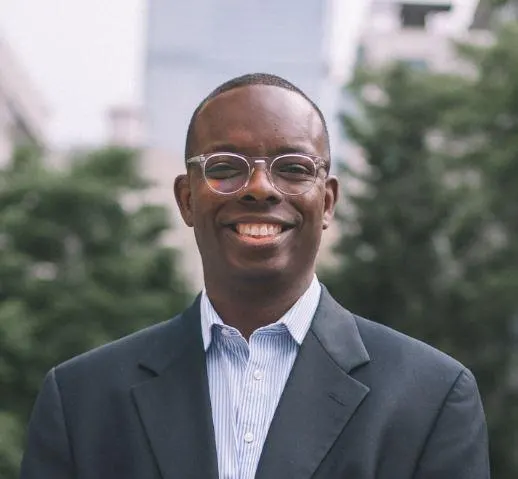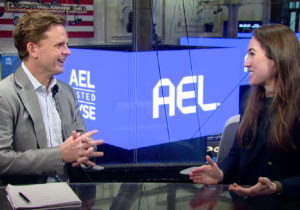George Wells, Chairman, Principal & Co-Founder of Wells Group of New York
Many young companies have almost all the right ingredients for success. But without a capable Chief Financial Officer or Chief Operating Officer in place, there is a serious risk a business will experience a failure in corporate governance and even struggle to survive. That’s where Wells Group of New York can make all the difference. Co-founded by George Wells, a Stanford Business School graduate and former investment banker at Morgan Stanley and The Goldman Sachs Group, Inc., the firm was designed to fill a niche that many young companies find too expensive to build out: a robust finance department.
In an interview with CorpGov, Mr. Wells explains how his career on Wall Street and experience at Stanford led him to create his company. He initially began working with early-stage companies in Silicon Valley, offering them experts in finance, accounting, operations, and growth strategy – but without any new full-time hires. Today, from the firm’s headquarters in New York, Mr. Wells often gets referrals from board directors who feel the need to have a complete and competent C-Suite in place at all times. The full interview is below:
CorpGov: How did you become interested in entrepreneurship?
Mr. Wells: Back in 1997 at age 19, I began my career in investment banking by interning in the Salomon Brothers’ Corporate Finance Energy Group. I continued to work in the investment banking industry up until late 2009 when I started the predecessor to Wells Group of New York. I was initially drawn to investment banking because it provided an opportunity to make an outsized impact on Fortune 500 businesses at an extremely young age.
Separately, my father was an entrepreneur who I began working for at age 13 performing accounting & finance related activities such as reconciling bank accounts and forensic accounting. I guess you could say it was in my DNA. My father was born on a tobacco plantation and was very successful in his own right, so I always felt that true long-term wealth creation and freedom meant you had to be your own boss. Early in my career, my dream was to start my own boutique investment banking firm, but I found myself increasingly drawn to operating businesses.
CorpGov: How did you begin working on the initial concept of the full service fractional financial services company?
Mr. Wells: While attending Stanford Graduate School of Business, my classmates were working at startups in droves. I noticed the key top-of-mind items for a successful startup – an innovative idea, strong product and tech teams, and ultimately securing venture capital funding from Silicon Valley – didn’t necessarily protect founders from solving finance and operational problems. These companies could not justify paying for a finance department which structurally consists of a CFO type, Controller and Bookkeeper. However, they need all of these roles to ensure they were deploying capital in the right way armed with accurate GAAP reporting, cash projections and general compliance with federal and state regulations. That said, they do not need these positions filled on a full-time basis. It was at this point that I recognized the gap in the market for sophisticated outsourced financial solutions for startups and entrepreneurs.
CorpGov: Did being at Stanford shape this path?
Mr. Wells: Without question. I decided on Stanford Graduate School of Business for my MBA program due to the program’s focus on creating leaders looking to disrupt the status quo. In my previous life, I worked in Mergers & Acquisitions at Morgan Stanley followed by the Principal Investment Area at Goldman Sachs. While at Goldman, I worked as a private equity and mezzanine debt investor. This role allowed me access senior management and attend quarterly Board of Director meetings. The academic and professional experience business school afforded me coupled with this experience inform my job on a daily basis; I traverse serving as interim senior management while being fiscally responsible to the Board and wider investor base of my clients.
CorpGov: How did you meet your first clients?
Mr. Wells: While at Stanford Graduate School of Business, I interned for Lieberfarb & Associates, an incubator and investment firm started by Warren Lieberfarb. He is known in Hollywood as the “Father of the DVD” due to his work evangelizing the format as the President of Warner Home Video for twenty years. The firm became my anchor client when I decided to hang my shingle in late 2009. The initial clients that followed were small seed and Series A stage Los Angeles startups I met by networking with CEOs. There were many innovative companies sprouting up over a decade ago as Silicon Beach first became a burgeoning setting for media and technology startups.
CorpGov: What is the definition of full service fractional financial services?
Mr. Wells: Full service fractional financial services means that a company can leverage a team of experts in finance, accounting, operations, and growth strategy tailored to the specific and unique needs, without taking on additional full-time hires. The company can leverage all of the benefits of having an in-house CFO, COO, CPA, Compliance Department, Investor Relations Specialist, and Financial Analyst without taking on the financial commitment of full-time employees. In early stages, a startup’s needs are very simple and clear – financial reporting, strategic financial analysis, and corporate governance support in the form of investor relations. By utilizing a service such as Wells Group of New York, startups can access experts only when needed, which helps them to fully control Finance & Accounting spend, something that investors certainly appreciate.
CorpGov: What is the most effective approach to fractional C-Suite Leadership?
Mr. Wells: Effective C-Suite Leadership comes down to having a vision, executing on that vision, and troubleshooting when things don’t go as planned. As a fractional function, the expectations are the same, and the insights can be enhanced given our experience with such a wide array of clients. Supplementing C-Suite Leadership, we’re constantly asking our team and our client’s teams the most important questions – how are we performing against plan and investor expectations? What is our growth plan for the next 1-5 years, and what is our strategy to get there? If we deviate from plan, how do we correct the course? How does our best case compare to our worst case, and what’s our action plan in the event of the worst case? (This is an especially important question when managing cash).
By partnering with a fractional C-Suite leader, you get the advantage of working with an expert who has a ton of experience at other startups and can leverage that experience to help answer these questions on a daily basis. We are committed to constantly problem solving and helping our clients optimally perform, leveraging what we have seen across industries and similarly sized / stage business.
CorpGov: What is the key, in your opinion, to a successful remote relationship? What does your typical day look like?
Mr. Wells: A successful remote relationship depends upon deliberate communication. I do my best to respond to clients as soon as possible; it’s part of being a partner and advocate.
My typical day begins at 6am. I grab coffee and head to the gym for an intense cardio workout, arriving at our office located in the Flatiron district by 8am. From 9:30-6, I’m working directly on-site with clients, reviewing financial performance, making key decisions with the leadership teams, and problem solving as needed. I keep in close touch with my team, who consults me while they execute on client requests using highly specialized skills. I return from client sites to our offices around 6:30pm to cap off the day by touching base on key deliverables. Admittedly, I am a bit of a workaholic and am the last to turn off the lights in our office alongside my business partner Evan Zawatsky.
CorpGov: What role does corporate governance play in your position as a C-Suite executive offering remote financial services?
Mr. Wells: During the initial stages of a company’s life cycle, corporate governance is a chief element of success for it is the system by which companies are directed and controlled. Boards of Directors are responsible for the governance of their companies through the supervision of management decisions. These Board members often advocate for our services as a result of over a decade of trust building, fostered by offering best-in-class strategic consulting to over one hundred companies. As a fractional CFO, we are responsible for reporting the financial performance in a timely and reliable manner. The investors’ role in governance is to appoint the directors and the auditors and to satisfy themselves that an appropriate governance structure is in place. As a result of our deep experience, we are able to advise on strategic issues leveraging our experience working with a multitude of companies in different situations.
For over two years, I also served as full-time SVP and CFO for Zola, the fastest-growing wedding company in the United States. During this period, I played a key role in developing the finance, accounting and legal systems reporting to the Board on all of these matters. This experience allows me to offer world-class advice having served as a member of the executive team for some of the most successful venture capital firms in the world. Having clearly delineated roles and responsibilities enables companies to optimize performance and grow most efficiently. At the beginning of an engagement, we always outline the most pressing issues we foresee from a finance, accounting, and strategy perspective and delineate who the owner of each of these should be. We work alongside internal teams at all of our clients as a partner and advisor. Corporate governance is about creating transparency and operating efficiently. Working as an outsourced executive is no different – specifically as it relates to the Interim CFO and Controller roles.
About George Wells
George Wells is Chairman of Wells Group of New York, an interim CFO and COO management consulting firm. Currently, George serves as the COO/CFO at Lehmann Maupin, one of the leading contemporary art galleries in the world and Interim CFO of Maisonette, a children’s e-com marketplace that connects consumers to some of the top children’s luxury brands and independent boutiques. Wells Group offers these services by employing a highly skilled team that specializes in finance, accounting and corporate strategy.
Through October 2017 George served as the CFO of Zola, the fastest growing wedding registry and wedding company in the country. As a member of Zola’s eight-person executive team, George was responsible for designing and implementing the finance, accounting, legal and HR administrative functions as the first finance executive hire. During his time at Zola, revenue grew from single digit millions to hundreds of millions in a two year timeframe.
Bit by the entrepreneurial bug of his father’s legacy, Stanford MBA and working with his mentor Warren Lieberfarb, George finally took the plunge in starting the predecessor to Wells Group.
George serves on the Out in Tech board, an organization committed to promoting diversity in the tech and startup community, and also plans to sponsor a scholarship beginning this Fall at his alma mater, Morehouse College, for students interested in pursuing a career in finance.
Contact:
John Jannarone, Editor-in-Chief
www.CorpGov.com
Twitter: @CorpGovernor






